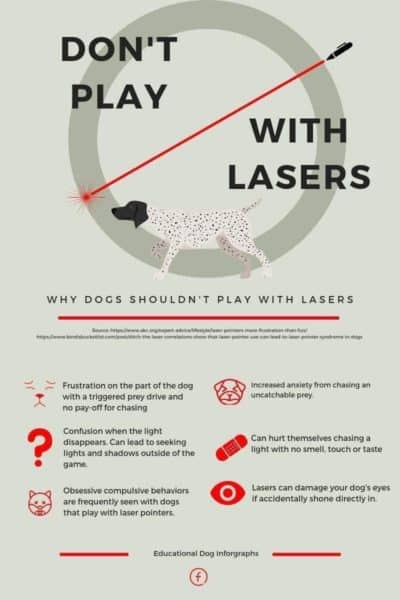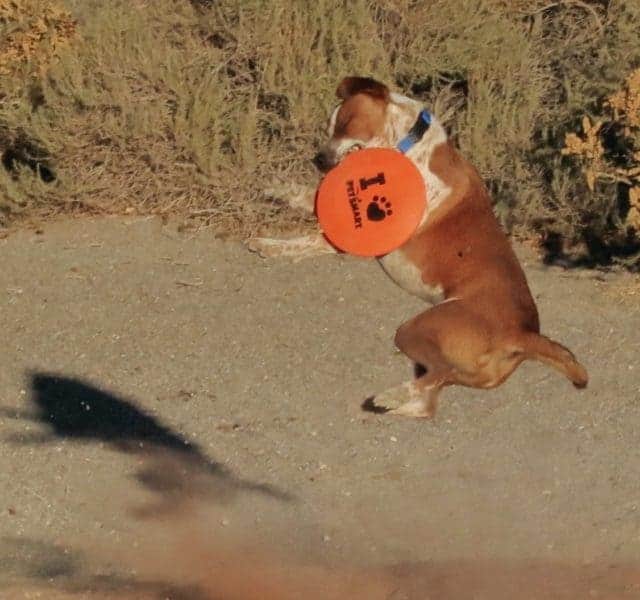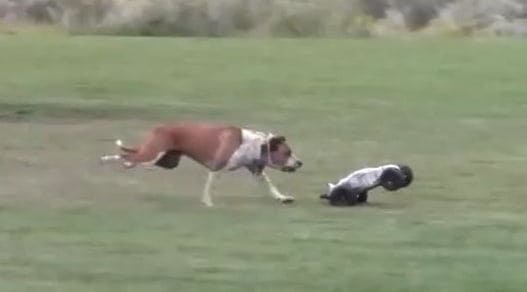This is certainly one of those Clean Sweeps, where every single suggestion they make is so very wrong, with many based on simple nonsense. Yet, their arguments play into some common assumptions or beliefs about animal behavior so many people just don’t question them.

Laser Pointers: More Frustration Than Fun, American Kennel Club
100%. Cats, sure. Dogs, NO.
Arie Deller, Arie’s Dogland
Now, taking this point by point
Frustration on the part of the dog with a triggered prey drive and no pay-off for chasing.
Oh, for sure, whenever one dog chases another it must be nothing but prey drive and he should always be permitted to tear the other dog apart. Really? What about the ball you throw? Should we always tear it to pieces each and every time to avoid frustration? Try learning what Play Drive is, and what it is based upon for dogs. Then learn how it is first practiced in their play.
If you actually look at applied animal behavior sciences you will find there are many similarities between dogs, cats, and young kids. Yet they say laser chasing is just fine for cats? That they won’t be frustrated with an uncatchable prey? And since most predators in nature have more misses than catches, what about all those frustrated foxes, hyenas, and lions?
Confusion when the light disappears. Can lead to seeking lights and shadows outside of the game.
So, when a cat, rabbit, or ball disappears the dog becomes confused? Or, do they just take a quick look around, then just walk away from it? Sure, if a pursued lizard escapes in a bush, the dog might later on carefully look while passing that and nearby bushes. So what?
Obsessive-compulsive behaviors are frequency seen with dogs that play with laser pointers.
Two things are quite obvious here. First, these people have no idea how to actually diagnose canine compulsive disorder. Next, they are seriously inflicted with confirmation bias. Finally, I’ve seen a few people just ignore likely compulsive behavior in their dog, until later seeing it brought out with a laser pointer.
While those with pathological compulsive behaviors are treated differently, for dogs (and cats) who go wild with a laser it offers an opportunity to teach and practice impulse control. Instead, if you let them go completely wild with anything (laser, ball, etc.) you are then the one causing the issue.
Just stop a moment and think back to the last Cattle Dog or Lab you saw who wanted only to continue running after the ball or frisbee. The dog might nod to you or another dog in passing but seemed to have no other real joy in life beyond that ball. Isn’t that a sort of obsessive behavior? Isn’t that dog then missing out on a great deal of possible joy in his life?
Increased anxiety from chasing an uncatchable prey.
I’ve seen Border Collies beginning training towards frisbee competition who had to be sedated and committed for weeks of therapy due to all that anxiety!…
Or, maybe not.
Sure, the frisbee is (eventually) catchable, but there’s no way the dog will know that at the start. And we have many at the dog park who really enjoy a big chase after the leader, but really have no interest at all in actually catching them. Is that now terribly bad for their mental health??

Can hurt themselves chasing a light with no smell, touch, or taste
In case you haven’t noticed, while your dog is running after a ball, until they catch it the dog will not be able to smell, touch, or taste it. If they were running so very wild for a light as to hurt themselves, just imagine your dog running after a bird they saw who then flies away. Their warning here just makes no rational sense.
Lasers can damage your dog’s eyes if accidentally shone directly in.
From a close distance for a period of time, yes. But dogs, together with humans, share something called a blink reflex. By the way, perhaps next time don’t hit your dog in the eye with the ball, those things can also be dangerous, as can running into bushes and many other things.
What is really happening
There is no inherit difference between a dog chasing a ball, frisbee, or laser light. In practice, however, you can only throw so many balls so quickly, so the dog gets a chance to rest and calm down a little between throws. With a laser light, you can not only move it much faster, but can keep it wildly zipping around until your dog’s exhausted.
One of my dogs chases a remote-controlled car in a park, often for some very fast and long runs. I could keep him running until he collapses from heat exhaustion, but I don’t.

In both of those cases, letting the dog get too wild or too exhausted has nothing to do with the game, but only the person running it. If you look closely at several social dogs playing wildly with each other, every once in a while one of them will signal for a break, and they will all stop.
At the other extreme, a dog who has few play skills, little social interaction, and gets little exercise could easily become too excited over a laser light. But, whose fault is that?
The issues reported with using a laser light are really no different from any other active game. Keep the wild play in moderation and apply some rules and rest times. For any dog who seems to go wild with any activity, applying rules allows you to teach behavior to manage that, and his reward is simply getting more of what he wants.
In summary
Through their lives, many dogs (and people) will occasionally find some activity which really excites or attracts them. If they are very young and are allowed to take this to excess it may be very harmful. We see this all the time in raising children, and the poor results sometimes when the guidance and control are lacking.
There’s no reason that should be any different here. When dealing with dogs who seem to show uncontrollable excitement it’s really never limited to only one issue. Instead, I find several related issues, then start behavior conditioning with the mildest of them. Before very long, the dog is having fun racing after the laser, stopping for breaks on a verbal prompt, and accepting the end of the play session.
